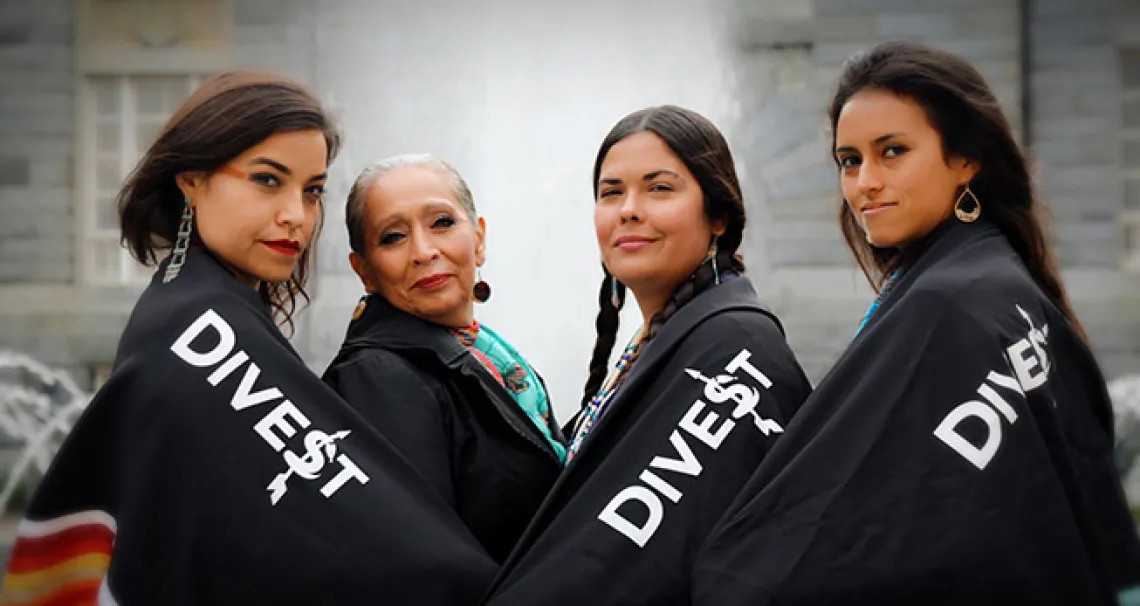International Human Rights Workshop Partners with Water Protectors Legal Collective

The International Human Rights Workshop at University of Arizona Law’s Indigenous Peoples Law and Policy Program is working with the Water Protectors Legal Collective to develop an international human rights response to the legal and human rights concerns facing “water protectors” demonstrating against the Dakota Access Pipeline (DAPL) in Standing Rock, North Dakota.
Under Professor of Practice Seanna Howard’s direction, law students in the International Human Rights Workshop are conducting research and developing legal strategies to engage international and regional human rights bodies, including United Nations mechanisms and the Organization of American States, Inter-American Commission on Human Rights.
“As legal remedies are pursued domestically, it is vital to simultaneously bring attention internationally to the violation of the constitutionally protected right to peaceful protest,” said Robert A. Williams, Jr., E. Thomas Sullivan Professor of Law and Faculty Co-Chair, Indigenous Peoples Law and Policy Program. “Petitioning international human rights bodies will provide a new forum to voice the concerns of those participating in the No DAPL movement.”
The collaboration between the Indigenous Peoples Law and Policy (IPLP) Program and the Water Protectors Legal Collective (WPLC) is planned to support the legal efforts of the water protectors seeking judicial relief for violations of their civil and human rights. It will take the form of a comprehensive report addressing issues such as suppression of peaceful assembly and free expression, criminalization of dissent, protection of human rights defenders, and the role of extractive industries in the violation of indigenous peoples’ human rights.
IPLP faculty and students contributing to landmark human rights advocacy projects is a pillar of the IPLP Program. Students in IPLP clinical projects have been involved in precedent-setting human rights cases supporting indigenous communities in the U.S., Canada, Mexico, Belize, Nicaragua, Brazil, and the Congo.
IPLP Student Meets with European Officials During DAPL Divestment Campaign
The Human Rights Advocacy Workshop is working alongside IPLP Doctor of Juridical Science (SJD) candidate Michelle Cook (Diné/Navajo), a founding member of the WPLC. Cook is also a member of the Women’s Earth and Climate Action Network divestment campaign, which recently met with officials from across Europe to encourage some of the world’s largest financial institutions to withdraw financial support from DAPL.
Cook and other members of the divestment delegation met with officials from Norway, Switzerland, and Germany to share their experiences on the front lines of the DAPL movement and urge divestment from the financial institutions providing funding to the DAPL. International banks and financial institutions in these countries are part of 17 banking entities that direct and facilitate the flow of global capital necessary to finance, advise, insure, and provide credit to extractive industry projects like the DAPL.
Reflecting on the experience as a member of the divestment delegation Cook said, "Norway is one of the largest investors in oil and gas development in the world. Indigenous peoples’ lands and territories are often ground zero for energy development. Therefore, requesting Norway's banks and financial institutions to uphold indigenous peoples’ human rights in oil and gas investments is critically important in advancing and protecting indigenous peoples’ rights to self-determination, consultation, consent, and cultural survival. I hope that these delegations develop a practice and expectation among financial institutions that if they invest in projects or companies that negatively impact indigenous peoples’ rights, they can expect indigenous peoples to show up asking for accountability and divestment.”
